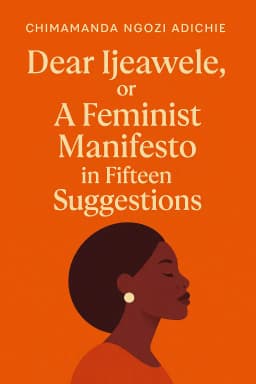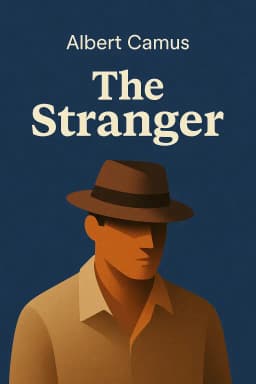
God vs. The Cosmos
A Philosophical Guide to Living
Golden Hook & Introduction
SECTION
Michael: Most people think philosophy is just useless, abstract navel-gazing. The ancient Greeks would have laughed at that. For them, philosophy wasn't an academic subject; it was a survival kit. It was literally about learning how to 'save your skin' from the one thing that terrifies us all. Kevin: Death. You’re talking about death. That’s a pretty intense way to start, but I’m in. It beats thinking of philosophy as a bunch of old guys in togas arguing about how many angels can dance on the head of a pin. Michael: Exactly. And that's the central premise of the book we're diving into today: A Brief History of Thought by the French philosopher Luc Ferry. Kevin: Luc Ferry… isn't he the guy who was also France's Minister of Education? That's an unusual combo. A philosopher in charge of a country's school system. Michael: It is. And it explains why this book is so different. It's not a dry academic text; it became a national bestseller in France, and it’s widely praised for being incredibly clear and practical. Ferry's whole mission is to show that philosophy is a tool for living, not just for exams. He actually wrote it after improvising a philosophy course for friends on holiday, trying to make it accessible for everyone, from teenagers to adults. Kevin: I like that. A philosophy born from a dinner party, not a dusty library. So, where does this survival kit begin? Michael: It begins with the first great attempt to rationally conquer the fear of death. He takes us back to the ancient Greeks, specifically the Stoics.
Philosophy's First Promise: How the Greeks Tried to 'Save Their Skin' from Death
SECTION
Kevin: Ah, the Stoics. The original stiff-upper-lip guys. The ones who tell you to just be emotionless and suck it up, right? That’s the modern stereotype, anyway. Michael: That’s the stereotype, and Ferry argues it’s a complete misunderstanding. Stoicism wasn't about suppressing emotion; it was about understanding the world so clearly that you wouldn't be tormented by irrational fears. Ferry breaks down their philosophy into three parts. First, there’s theoria, or theory—which is about contemplating the world as it truly is. Kevin: Okay, ‘contemplation of the cosmic order.’ What does that look like on a Tuesday afternoon for a regular Roman guy? Is he just staring at the clouds? Michael: It’s more active than that. For the Stoics, the universe, or kosmos, was a single, perfect, harmonious living being. It’s divine, not because a bearded god made it, but because it’s perfectly ordered and rational. Think of it like a beautiful, intricate clockwork mechanism. Everything that happens, from a leaf falling to an empire rising, is a necessary part of this perfect whole. So, theoria is about learning to see and appreciate that underlying logic and beauty in everything. Kevin: Okay, so the universe is one big, beautiful, logical machine. I can see how that might be comforting. What’s the second part? Michael: The second part is ethics, or how to live. And for the Stoics, it was simple: if the universe is perfectly just and harmonious, then the right way to live is to align yourself with it. You try to be a just and harmonious part of the whole. You adjust your own will to the will of the cosmos. Kevin: That sounds nice in theory. But what happens when the ‘harmonious cosmos’ gives you a terminal illness or your house burns down? How does that feel just? Michael: This is where the third and most important part comes in: salvation, or what the Greeks called wisdom. This is the practical application. The Stoics argued that our suffering doesn't come from events themselves, but from our judgment about those events. We suffer because we want the world to be different than it is. The goal of Stoic practice was to train yourself to stop fighting reality. Kevin: How do you even begin to train for that? It sounds like a superpower. Michael: With some pretty radical exercises. Ferry tells this amazing story about the Cynic philosopher Crates, who was a major influence on the Stoics. To teach his students to be indifferent to the opinions of others—which is a huge source of anxiety—he would make them do things like drag a dead, stinking fish on a string through the crowded Athenian marketplace. Kevin: You’re kidding. Drag a dead fish? The humiliation must have been off the charts. Michael: That was the entire point! You’d be mocked, insulted, people would throw things at you. But if you could endure that, you’d have a profound realization: the opinions of the crowd are just noise. They have no real power over you. You learn to detach from the folly of human judgment and align with the reality of the cosmic order. You’re training yourself to care about what’s true, not what’s popular. Kevin: Okay, dragging a fish is one thing, but what about real loss? I read that the Stoic philosopher Epictetus advised that while you’re kissing your child goodnight, you should murmur to yourself, ‘Tomorrow you will die.’ That sounds monstrous, not wise. Michael: It sounds brutal to our modern ears, doesn't it? But Ferry explains the Stoic logic. The point isn't to be cold or unloving. The point is to confront the truth of impermanence head-on. By constantly reminding yourself that your child, your spouse, your own life is temporary and part of a natural cycle, you prepare yourself for the inevitable. You love them fully in the present, without the paralyzing fear of a future loss you can’t control. It’s about conquering the fear of loss, not the love itself. Kevin: I get the logic, but it still feels...impersonal. Like you’re supposed to see your loved ones as just temporary parts of a cosmic machine that will eventually be recycled. Is there any room for personal grief? Michael: And that right there, that feeling of impersonality, is the exact vulnerability that Stoicism had. It was a powerful system, but it asked you to accept that in the grand scheme of things, your individual existence, your personal consciousness, your unique love for another person, ultimately dissolves back into the whole. You vanish into the cosmos. And for many people, that was a cold comfort.
The Christian Disruption: How Love and Humility Conquered the Cosmos
SECTION
Michael: And that very impersonality you pointed out, Kevin, was the Achilles' heel of Stoicism. It left a huge opening for a new idea that offered something radically different. And that idea was Christianity. Kevin: So this is where the philosophical battle really heats up. How did Christianity compete? Michael: Ferry argues it was a stroke of genius. Christianity essentially "hacked" Greek philosophy. It took the Stoic concept of the Logos—that divine, rational principle that orders the universe—and did something unprecedented. It said the Logos is not an impersonal cosmic structure; it's a person. It’s Jesus Christ. Kevin: Whoa. So the intelligence behind the entire universe became a specific guy you could have a relationship with. That’s a massive shift. Michael: It’s a complete game-changer. Suddenly, the divine isn't a distant, abstract principle you contemplate; it's a being who loves you personally. And this new doctrine came with a new promise, one that blew the Stoic offering out of the water. Ferry uses the story of Jesus raising Lazarus from the dead to illustrate this. When Jesus sees Lazarus's sisters weeping, he doesn't give them a Stoic lecture on accepting the cosmic order. He weeps with them. And then he brings Lazarus back, demonstrating the core Christian message: "love is stronger than death." Kevin: So it's a total paradigm shift. The Stoics say, 'You are a tiny, insignificant part of a beautiful, eternal machine. Accept your fate and dissolve gracefully.' And Christianity says, 'You, personally, are so loved by the creator of that machine that he will save you from it.' That's an infinitely more appealing offer. Michael: Infinitely. It’s the promise of personal, individual immortality. You don't just vanish into the whole. You get to be you, resurrected, and reunited with the people you love, forever. This was a doctrine of salvation tailor-made for the human heart. The Stoics offered wisdom and tranquility in the face of oblivion. Christianity offered victory over oblivion itself. Kevin: And it also seems to flip the whole idea of pride and reason on its head. The Greek philosophers were proud of their intellect. Michael: Absolutely. For a philosopher like Plato, you had to be a master of geometry and reason to access truth. Christianity introduced a radical new virtue: humility. The ultimate truth isn't accessed through brilliant reasoning, but through faith and love. As St. Paul famously said, the Christian message was "foolishness to the Greeks." The idea that God would become a humble, suffering human being was absurd to the philosophical mind. But it was this very humility that became the source of its power. Kevin: It also introduced this idea of equality, right? In the Greek world, some people were just naturally superior—aristocrats, philosophers. Michael: Yes, and Ferry argues this is one of Christianity's most world-changing contributions, one that even secular people live by today. Because salvation comes through faith, not intellect or birthright, every single human being has equal dignity in the eyes of God. A humble slave has the same access to salvation as a brilliant emperor. This was a moral revolution that laid the groundwork for modern concepts of human rights and democracy. The idea that all people are created equal is a direct descendant of this theological innovation.
The Modern Mess: From Humanism's High Hopes to Nietzsche's Hammer
SECTION
Kevin: So after Christianity dominates for centuries, what happens next? Where does the modern world come from? It feels like we’ve gone from a harmonious cosmos to a personal God. What’s the next big upheaval? Michael: The next upheaval is the collapse of both of those frameworks. The scientific revolution, with figures like Copernicus and Galileo, shatters the idea of a neat, human-centric cosmos. The Earth is no longer the center; it's just a rock spinning through a vast, silent, and seemingly indifferent universe. As the poet John Donne wrote, "'Tis all in pieces, all coherence gone." Kevin: So the divine clockwork of the Stoics is broken. And I assume the authority of the Church is starting to crack as well. What fills that vacuum? Michael: Humanity itself. This is the birth of Humanism. If there's no cosmic order to guide us and God is becoming more distant or doubtful, then we have to rely on ourselves. And the philosopher who lights this fuse is René Descartes. His famous declaration, "I think, therefore I am," is the starting point of modernity. The one thing you can be absolutely certain of is your own consciousness. The foundation for truth is no longer out there in the cosmos or in a holy book; it's inside your own mind. Kevin: We become the center of the universe. We have to create our own meaning, our own morality, our own salvation. Michael: Exactly. And this leads to what Ferry calls the "religions of earthly salvation." People start looking for meaning in grand human projects: the Nation, the Revolution, Science, Progress. The idea is that you can achieve a kind of immortality by sacrificing yourself for a cause greater than yourself. "To die for the homeland is to enter into eternity." Kevin: But that sounds like it has its own dark side. And this is where the final big figure in the book comes in, right? The man with the hammer. Michael: Friedrich Nietzsche. He arrives on the scene and looks at this whole humanist project with deep suspicion. He famously declares "God is dead," but he argues that we haven't understood the consequences. We’ve just replaced God with new idols. Kevin: So when Nietzsche says 'overthrow idols,' he's not just talking about God. He's talking about our modern idols too, like 'progress,' 'equality,' 'human rights'... He's saying these are just secular versions of Christian morality. Michael: Precisely. He calls them "feet of clay." Nietzsche's business, in his own words, is to "overthrow idols." He argues that the democratic ideal of equality, the socialist dream of a classless society, the humanist belief in reason—all of these are just a continuation of the slave morality of Christianity, which champions the weak and holds back the strong. He saw it as a force that leads to mediocrity. Kevin: That’s a deeply uncomfortable thought. So what’s his alternative? If all these ideals are just hollowed-out religion, what should we strive for? Michael: Nietzsche's ideal is what he calls the "grand style." It's not about dominating other people, which is a common misreading of his "will to power." It's about self-mastery. Ferry uses the analogy of a tennis champion. A novice player is clumsy and conflicted, fighting their own body. But a champion moves with a kind of effortless grace and power. They have harmonized all the conflicting forces within themselves—aggression and control, instinct and strategy—into a beautiful, powerful whole. That, for Nietzsche, is the goal: to become a work of art yourself. Kevin: To live with such intensity and self-mastery that you would be willing to live your life over and over again, exactly as it is, for all eternity. That’s his idea of the 'eternal recurrence,' right? Michael: That's the ultimate test. It’s a thought experiment. If you knew you had to relive every single moment—the joy, the pain, the boredom—an infinite number of times, would you be horrified or would you say "Yes!"? For Nietzsche, the goal is to live in such a way that you can embrace your fate completely, to love it. He calls this amor fati—the love of fate.
Synthesis & Takeaways
SECTION
Kevin: So after all this—the Greeks trying to reason their way past death, the Christians offering salvation through love, and Nietzsche smashing all the idols—where does that leave us? It feels like every foundation has been smashed. Michael: That's exactly Ferry's point. We're living in the rubble, but also in the freedom that comes with it. We can't go back to a simple belief in a harmonious cosmos or a single divine plan. The critiques from Nietzsche, Freud, and Marx have revealed too much. But Ferry argues, and this is his big takeaway, that we can build a new, post-Nietzschean humanism. Kevin: What does that even look like? A humanism that doesn't believe in the old humanist idols? Michael: It's a humanism that stops looking for salvation in grand, abstract systems—whether it's the cosmos, God, or the Nation. Instead, Ferry argues we need to find what he calls "transcendence within immanence." Finding the sacred, the thing that gives life meaning, not in the sky or in the future, but right here, in the world. Kevin: And where do we find it? Michael: In love. But a very specific kind of love. Not love for someone's qualities—their beauty, their intelligence, their humor—because those things fade. He argues for a love of the unique, irreplaceable singularity of another person. It's the love Montaigne described for his friend: "Because he was he, because I was I." It's a love that sees the other person as an entire world, a world that can never be replaced. Kevin: So the ultimate answer to the fear of death isn't a grand philosophical system, but something deeply personal and concrete. It's about who you love, and recognizing their absolute, unrepeatable value. Michael: Exactly. As Ferry puts it, the final wisdom is a "wisdom of love." It’s the only thing that can stand against the terror of mortality. It doesn't promise us we'll live forever, but it gives us a reason to live fully now, in the face of that finitude. And maybe the question for all of us to think about is: in a world without easy answers, what or who gives our life that kind of meaning? Kevin: A powerful question to end on. It brings 2,500 years of thought right back to our own lives. Michael: This is Aibrary, signing off.









